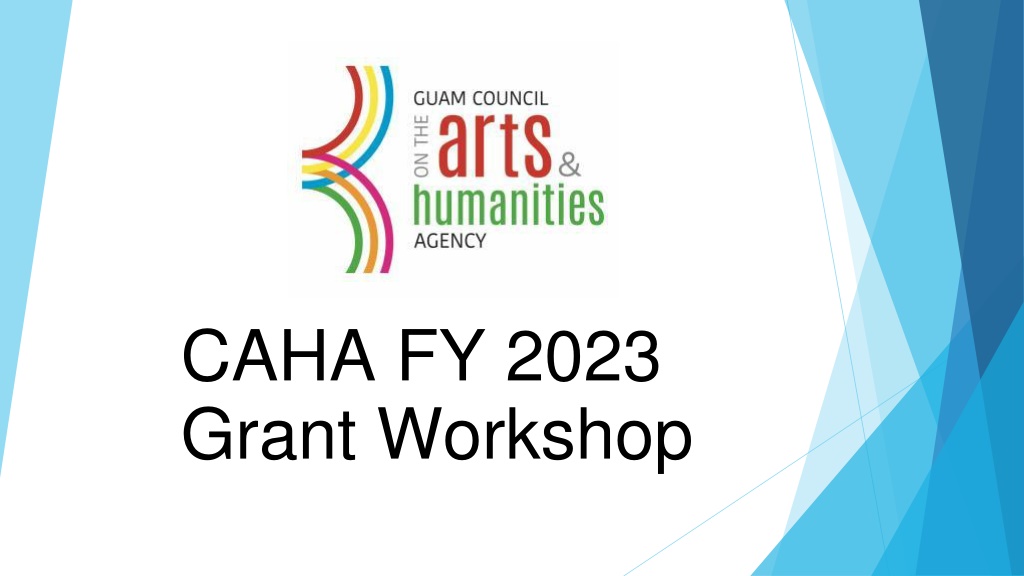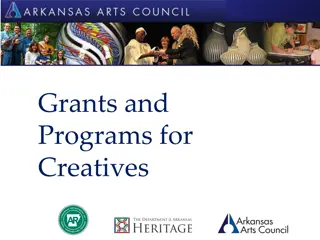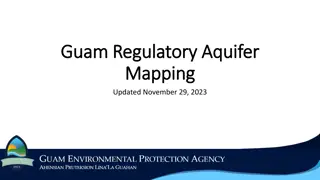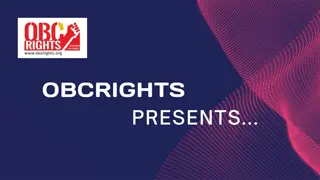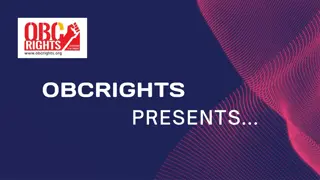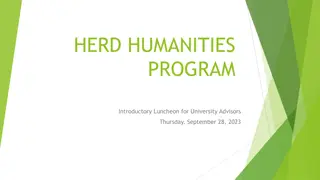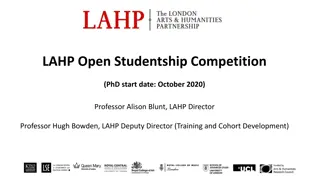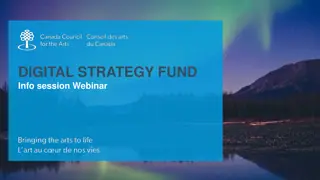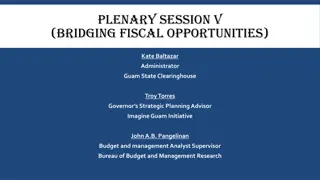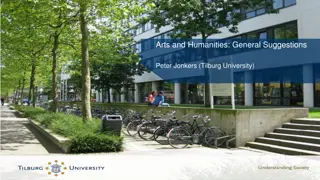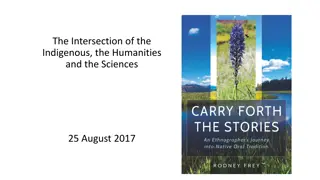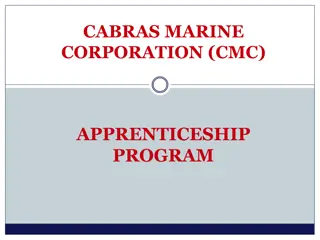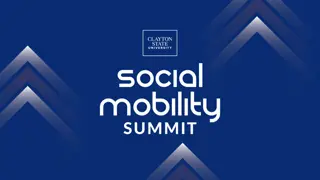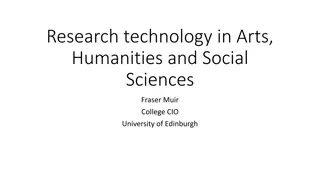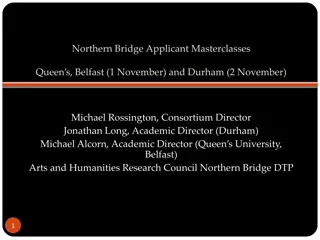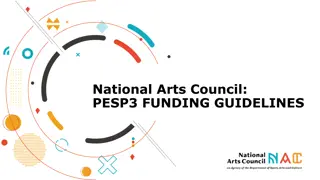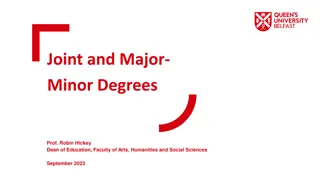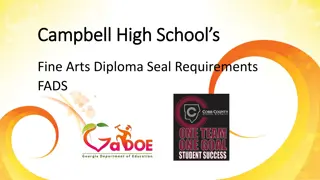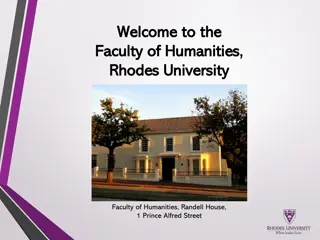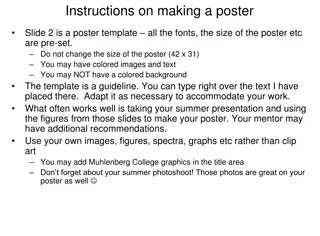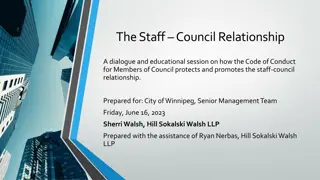Guam Council on the Arts and Humanities Agency Overview
Guam Council on the Arts and Humanities Agency (CAHA) is dedicated to promoting artistic practices, providing opportunities for creative expression, and fostering cultural appreciation in Guam. Established in 1967, CAHA offers grants, programs, and services to support artists and engage the community in various art forms. Their mission is to inspire creativity, encourage cultural preservation, and weave arts into daily life. CAHA collaborates with the National Endowment for the Arts to fund projects and initiatives that enhance Guam's artistic landscape.
Download Presentation

Please find below an Image/Link to download the presentation.
The content on the website is provided AS IS for your information and personal use only. It may not be sold, licensed, or shared on other websites without obtaining consent from the author. Download presentation by click this link. If you encounter any issues during the download, it is possible that the publisher has removed the file from their server.
E N D
Presentation Transcript
CAHA FY 2023 Grant Workshop
AGENDA 1. Introductions 2. About CAHA 3. Grant Overview and Process 4. Completing the Application 5. Closing
BOARD, MANAGEMENT & STAFF STAFF Executive Director BOARD MEMBERS Jackie Balbas Sandra Flores Francis Guerrero Chairperson Angie Taitague Joseph Certeza Vice Chairperson Mark Duenas Patricia Krise - Secretary Joey Manibusan Honorable Mayor Jessy Gogue Ordilia Cruz Donna Kloppenburg CAHA Master Francisco Rabon Max Ronquillo Rolando Zepeda Simone Bollinger Al Edrich Labang
ABOUT CAHA 1967 - Initially called the Insular Arts Council (IAC), CAHA began as a program under the University of Guam by the late Dr. Pedro Sanchez. 1975 Late Governor Ricardo Bordallo made IAC a part of the Executive Office through Executive Order 75-23. 1982 Late Senator Cecilia Bamba and Senator Carmen Kasperbauer sponsored Public Law 16-122 which established CAHA 1985 P.L. 18-8 re-established CAHA as Guam s State Arts Agency 2011 Governor Eddie Calvo, through Reorganization Advisory No. 6, merged CAHA under the umbrella of the Department of Chamorro Affairs 2019 Governor Lourdes Leon Guerrero, through Executive Order No. 2019- 14, removed CAHA from the Department of Chamorro Affairs and reestablished it as a separate entity.
VISION To inspire creativity and expression
MISSION CAHA exists to encourage and promote the artistic practice of our artisans and create opportunities for Guam residents to learn, experience express and appreciate art and artistic talent in all its forms.
MOTTO Weaving Arts and Humanities into our daily lives
MORE INFORMATION CAHA provides programs and services that nurture creativity, promote cultural identity and preservation, and encourages community involvement and participation in the arts. PROGRAMS INCLUDE: Artist Directory Art Bank CAHA Gallery Guam Master s Award Art in Public Places (Percent for the Arts) Grants and Fellowships
CAHA GRANTS OVERVIEW CAHA supports arts projects in communities across the island. The program is funded through a partnership agreement from the National Endowment for the Arts. CAHA awards up to $160,000 in grants annually. Maximum grant amount request is $10,000. Maximum grant amount request for Fellowship is $3,000 All grants are made on a yearly basis and new applications must be submitted each year. The grants program is highly competitive. An award for the current year does not guarantee an award for the following year(s). Grant awards are subject to the availability of funds. Grantee must be willing to assist CAHA in upcoming events for performances or exhibits to be scheduled with CAHA staff.
GRANT CYCLE Announcement of Grant Cycle/ Grant Cycle begins February 7, 2022 Grant Application forms for pre-applying available March 16, 2022 1st Grant Application Workshop March 19, 2022 - 09:00AM June 30, 2022 11:59PM 09 00AM April 2, 2022 2nd Grant Application Workshop Deadline for INITIAL submission of grant applications via email to grants@caha.guam.gov. Applicants who have not submitted INITIAL applications by April 30, 2022 11:59PM will not be eligible to submit a FINAL application. April 30, 2022- 11:59PM
GRANT CYCLE, cont Applicant works with CAHA staff for a review of the INITIAL application in preparation for the FINAL submittal. May 1 - June 30, 2022 Deadline to submit FINAL grant applications via email to grants@caha.guam.gov. Applicants who have: 1. Not attended at least one workshop, and 2. Not submitted an INITIAL grant application by the April 30, 2022 Initial application deadline are NOT ELIGIBLE. June 30, 2022- Junedd 2022 11:59pm The Grant Review Committee a.k.a. Citizens Adivsory Panel, chaired by a CAHA Board Member and comprised of community volunteers, convenes to review grant applications July 2022 CAHA Board meets to review grant applications, makes final decisions, taking Citizen Advisory Panel recommendations into account (CAHA Staff are NOT involved in this process). Grant Awards announced - Letters of notification are sent out informing all applicants of the Board s decisions. June 30, 2022 11:59PM August 2022 October 1, 2022 - September 20, 2023 FY 2023 Project Period - Execution / Implementation
GRANT PROCESS To ensure that grants are distributed fairly, selecting recipients is a multi-step process: The applicant, individual or organization submits its application to CAHA that includes the project narrative and detailed budget breakdown. Citizens Advisory Panel in the various disciplines, chaired by a CAHA Board Member and comprised of arts, culture, and heritage experts, evaluate submissions. The Panels assess the artistic excellence and merit of the project, like potential impact to the community and reaches out to the underserved communities. Panel recommendations are then brought before the CAHA Board for review and action.
GRANT DISCIPLINES Arts-in-Education Performing Arts Visual Arts Folk Arts Media Arts Special Projects Underserved - Underserved audiences are those groups that lack access to arts education because of any barrier, such as language, geography, economic status, physical ability, etc.
CAHA GRANTS ARE MATCHING GRANTS All applicants must have adequate matching resources to qualify for a CAHA grant. CAHA support should be considered supplementary to the budget. Applicants are encouraged to seek funding sources other than CAHA, showing strong financial commitment to the applicant and project by others. Examples of other funding sources include: GVB, GHC and GPT. All grants, except for Fellowships must be matched dollar for dollar by cash and / or in-kind contributions in the following percentages: o Individuals Awards to individual applicants must be matched in cash by not less than 10% o Organizations Awards to organizations must be matched in cash by not less than 20%
FELLOWSHIPS Available to emerging professionals (0-3 years career time); individual fellow (3-5 years career time) and distinguished fellow/ established artisans (5+ years career time) in ALL artistic disciplines. Maximum grant amount request for Fellowship is $3,000 Applicants must be: o U.S. Citizen or permanent resident of Guam o A Guam resident for not less than 3 years prior to grant submission deadline and maintain residency during the duration of the grant period o Not less than 18 years of age o Not a degree seeking student at the time of application or during the duration of the grant period o Have not received a fellowship grant during the past 2 years
FELLOWSHIPS (cont) Recipients may use funds to: Set aside time to create art, improve their skills, or to do what is most advantageous to enhance their artistic careers Purchase supplies, materials, rental of equipment for the production of new work for services, rental of facilities and research directly related to the artist s work Professional development workshops and seminar opportunities Expenses associated with the presentation of the artist s work (exhibit costs, performances and publications) Fellowships DO NOT require a one-to-one match. They are non matching grants
WHO CAN APPLY FOR A GRANT? INDIVIDUALS U.S. Citizen or permanent resident of Guam who has resided on Guam for six consecutive months prior to grant submission deadline NON-PROFIT ORGANIZATIONS Incorporated for at least one year Tax exempt Have a valid UEI - (SAM) number OTHER APPLICANTS May apply under the umbrella of a qualifying organization which then becomes responsible for all fiscal and contractual agreements. Please note that organizations using the DUNS number for reporting will need to get a UEI (SAM) number at https://sam.gov/content/duns-uei no later than April 3, 2022. This is a new FY 2023 Federal requirement.
FY 2023 Call for Proposals CAHA will accept grant applications outside of these areas but projects that fall within the grant theme below will be given preference: Art Focus and Art Access This is an effort to foster better appreciation for our island s existing art and artists and to create wider access to these resources even when face to face gatherings are restricted. This theme also supports one of CAHA s most important roles which is to prepare artists to represent Guam at the Festival of Pacific Arts scheduled to be held in Hawaii in May 2024. Organizations, individuals, artists and scholars are encouraged to propose projects that bring greater focus and access to our island's artists and art of all kinds.
GRANT APPLICATION: CHECKLIST ORGANIZATIONS INDIVIDUALS Detailed budget breakdown (cash expense, in- kind contribution & cash income) Recent annual audit by an independent accounting firm or a published financial statement in a local paper (must clearly show date of publication) Copy of organization s Certificate of Incorporation and IRS letter granting Federal Tax Exemption Status Articles of Incorporation/ By-Laws Copy of UEI (SAM) Registration (https://sam.gov/content/duns-uei). This is a new FY 2023 Federal requirement and must be completed no later than April 3, 2022. Detailed budget breakdown (cash expense, in-kind contribution & cash income) Resume/ Biography Three letter(s) of personal recommendation Digital samples of work (i.e., pdf, Google Drive links, etc.) Letters of commitment from individuals/entities involved with the project
GRANT APPLICATION (Page 1) Applicant/ Organization Name SSN UEI (SAM) Number and TIN (Organizations Only). This is a new FY 2023 that must be completed no later than April 3, 2022: https://sam.gov/content/duns-uei) Mailing Address Are you a permanent resident of Guam? How long have you resided in the Territory of Guam? Contact Person & Contact Information Authorizing Official Project Title Type of Grant Applying For Start and End date # of Individuals to benefit # of youths benefitting # of Artists involved Provider of services (Organizations only) Grant Amount Requested List of other funding sources sought
GRANT APPLICATION (Page 2-3) 1. What is the project and its purpose? What do you plan to do? When? Where? 2.How will the project be accomplished and by whom? Identify participating artists by name. 3. If your project involves a performance(s), where will the performances be held and what is the seating capacity of the location(s)? 4. Specific community involvement (Identify committees, arts groups, volunteers, school, etc. who will be involved in any way in carrying out your project). 5. Specific communities to be served by the project? 6. How will the requested funds be spent? What other sources of funds are being sought for the project described in this application? 7. What are the anticipated results or effects of the project?
BUDGET: CASH EXPENSES A. Personnel/ Artistic: Payments for salaries, wages, and benefits specifically identified with the project: Artistic Directors Conductors Curators Dancers Composers Choreographers Designers Filmmakers Painters Poets Authors Sculptors Graphic artists Actors Musicians Instructors
CASH EXPENSES C. Personnel/ Technical-Production: Technical Management and Staff Technical Director Wardrobe Lighting and Sound Crew Stage Managers Stagehands Video and Film Technicians Exhibit Preparers/ Installers B. Personnel Administrative: Executive and Supervisory Administrative Staff Program and Managing Directors Business Managers Press Agents Clerical Staff Supportive personnel such as maintenance and security, ushers, and other front-of-the-house and box office personnel.
CASH EXPENSES D. Outside Artistic Fees and Services: Payments to firms or persons for the services of individuals who are not normally considered employees of Applicant, but consultants or the employees of other organizations, whose services specifically identified with the project who are serving in non-employee/ non-staff capacities. E. Outside Other Fees and Services: Payments to firms or persons for non-artistic services of individuals who are not normally considered employees of Applicant , but consultants or employees of other organizations, whose services are specifically identified with the project. F. Studio & Space Rental: Payments specifically identified with the project for rental office, rehearsal, theatre, hall, gallery, and other such spaces. Identify location and rate(s). G. Travel & Per Diem: CAHA funds CANNOT be used for AIR travel; however, expenses may be claimed as part of cash match. All costs for air travel directly related and specifically identified with the project. Fares, hotel expenses, food, taxis, gratuities, per diem payments, mileage, car rental costs, etc. Identify who is traveling, where they are traveling to and reason for travel.
CASH EXPENSES H. Marketing & Promotion: All costs for marketing/ publicity/ promotion, including newspaper, radio, and television advertising, printing and postage, space rentals directly connected to promotion, publicity or advertising. I. Remaining Operating Expenses: All expenses of the project not entered in other categories. Include fund-raising expenses, scripts and scores, electricity, telephone, storage, postage, photographic supplies, equipment rental, insurance fees, non-structural renovations, shipping and hauling expenses not entered under travel
GRANT APPLICATION: BUDGET (EXPENSES) YOU MUST KEEP ALL RECEIPTS, INVOICES, ETC FOR ALL EXPENSES. MAKE SURE THAT THEY ARE LEGIBLE AND CLEARLY LABELED. RECEIPT RETENTION IS PART OF YOUR CONTRACT.
GRANT APPLICATION: BUDGET (INCOME) Cash Income includes revenue or (earned income) and support (unearned income). Demonstrate that you have other sources of cash/ support for the project.
BUDGET: CASH INCOME A. Admissions: derived from the sale of admissions, tickets, subscriptions, memberships, etc. B. Contracted Services: Cash derived from fees earned through sale of services (other than this grant request.) Include sale of workshops to other community organizations, government contracts for specific services, performance or residency fees, tuition. Include foreign government support. C. Business/ Corporate Support: Cash support from businesses, corporations, and corporate foundations, etc. D. Foundation Support: Cash support from grants given for this project (other than this grant request) by private foundations, etc.
BUDGET: CASH INCOME E. Other Private Support: cash support from cash donations given for this project or a share of general donations. Do NOT include corporate foundation, or government contributions and grants. Include gross proceeds from fundraising events. F. Government Support: Federal: cash support from grants or appropriations given for this project by the federal government. State/ Regional: cash support from grants or appropriations given for this project by agencies of the state government and/ or multi- state consortiums of state agencies. Local: cash support form grants or appropriations given for this project by city, country, in-state, regional, and other local government agencies.
BUDGET: CASH INCOME G. Other Revenue: Revenue derived from sources other than those listed. Ex: catalog sales, advertising space in programs, gift shop income, concessions, parking, investment income, poster, t-shirts, etc. H. Applicant Cash: Funds from Applicant s present accumulated resources of savings or anticipated resources that Applicant plans to provide to proposed project.
GRANT APPLICATION: BUDGET (INCOME) YOU MUST KEEP ALL RECEIPTS, INVOICES, ETC FOR ALL INCOME GENERATED. MAKE SURE THAT THEY ARE LEGIBLE AND CLEARLY LABELED. RECORD RETENTION IS PART OF YOUR CONTRACT.
IN-KIND CONTRIBUTIONS Only donated items that are directly involved in the project described in this application should be included on the In-Kind section of the application. Items or services unrelated to the project are not acceptable.
IN-KIND CONTRIBUTIONS In-kind Contributions are NON-CASH contributions of an indirect nature toward the completion of a project and can include services rendered, rents, use of equipment, fuel costs, etc. Do NOT add In-Kind Contributions to the Cash Income or Cash Expenses section of your budget. Be sure to include rate information showing the dollar value. Example: If you show a dollar value for $1,000 for volunteer services, how many volunteers are anticipated for how many hours and at what rate per hour? (Usually calculated at minimum wage unless the volunteer is donating services which he/ she provides as a part of his/ her professions. Donated materials should be calculated at fair market value.
LEGAL ASSURANCES In the event that a grant is awarded as a result of this application, the following terms are conditions shall be complied with as signified by the applicant/ organization s signature(s). This application shall become part of the legally binding contract between the applicant/ organization and CAHA. Signatures: The application form must be signed by all applicants. Individuals applying will be the authorizing official. Authorizing Official Individual Applicant or Organization (Individual with authority to legally obligate the organization) Fiscal Officer Individual providing accounting oversight and management for the applicant s organization.
CAHA DOES NOT FUND: Building, renovation, maintenance of facilities, or capital expenditures Off-island travel Purchase of permanent equipment Ongoing projects or projects completed prior to application Tuition replacement for college/ University study Deficits incurred from past activities Entertainment or refreshments (may include if funds used are from matching or applicant cash) Publications (CAHA only funds the creative aspect of the project such as the Master copy)
CAHA WILL NOT ACCEPT: Incomplete Applications Applications using a prior year application form Unsigned Applications Applications that do not have the required documentation (see appropriate checklist) Final applications whose applicants have not attended a mandatory workshop (March 19, 2022 09:00AM, April 2, 2022 09:00AM) AND who have not submitted an INITIAL application by April 30, 2022 @11:59PM Late Applications - Final applications not received via email (grants@caha.guam.gov) by Thursday, June 30, 2022 @11:59pm.
EVALUATION CRITERIA Does the project indicate high quality within the art form or contribute to the overall quality of arts on Guam? Does the applicant s narrative make a case for need of the project? Is the public involved in evaluating the project as well as encouraged to participate through attendance? Is the project realistic with an adequate cash match and reasonable ratio of program expenditures to administrative costs? Is there evidence of adequate and skilled project personnel?
EVALUATION CRITERIA (cont) Have all the questions under project description been answered in concise and complete manner? Is the project exceptionally innovative or creative? Quality of artists involved in the project (demonstration of previous work) Quality of support material (letters of support, reviews from recognized experts, videos, and demonstration of the applicant s potential).
REASONS PROPOSALS GET REJECTED * Proposals are unclear or missing required information. * Proposals are too ambitious for the amount of time and/ or money requested. * Budget is vague, inconsistent, or unrealistic. * Proposal is poorly written. * Project is ongoing or has been completed prior to application
PAYMENTS FOR GRANT RECIPIENTS Grant Awardees are paid out in the following manner: Does NOT apply to Arts-in-Education grants* New Grant Recipients: Paid out in 3 installments 1. 50% of the grant funds to be released after the contracted has been signed and processed. 2. 25% of the grant funds to be released after a mid-progress report with supporting documents has been submitted. 3. 25% of the grant funds to be processed and released AFTER the grantee completes and submits a CAHA Final Project Report Form, which includes a narrative and financial report with supporting documents and materials. Final report must be accepted and approved for payment by CAHA before the final payment is released to grantee.
PAYMENT FOR GRANT RECIPIENTS Previous Grant Recipients: Paid out in 2 installments 1. 75% of the grant funds to be released after the contract has been signed and processed. 2. 25% of the grant funds to be processed and released AFTER the grantee completes and submits a CAHA Final Report From, which includes a narrative and financial report with supporting documents and materials. Final report must be accepted and approved for payment by CAHA before the final payment is released to grantee. Arts-in-Education Grant Recipients are paid out in the following manner: AIE grantees are required to submit weekly reports with supporting documents and materials due at the end of each residency month. Upon receipt of the monthly reports to CAHA, payments to the AIE grantee will be processed and released.
IMPORTANT INFORMATION Apply for a grant here at the Guam Council on the Arts and Humanities website: https://guamcaha.org/happenings Please call our office at 671-300-1206 through 1208, or email info@caha.guam.gov if you need further information or have any questions. If you are emailing, please use the subject line FY 2023 Grant Application inquiry . Grant applications will only be accepted via grants@caha.guam.gov (any inquiries, please use info@caha.guam.gov) Deadline to submit the INITIAL grant application is via email (grants@caha.guam.gov), on or before Saturday, April 30, 2022 @11:59pm. Applicants who have not attended a mandatory workshop AND who have not submitted an INITIAL application by April 30, 2022 @11:59pm will not be eligible to submit a FINAL application. Deadline to submit FINAL grant application is via email (grants@caha.guam.gov), on or before Thursday, June 30, 2022 @11:59pm.
THANK YOU FOR COMING AND ATTENDING THIS PRESENTATION! CAHA looks forward to your applications!
